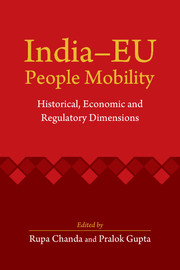Book contents
- Frontmatter
- Dedication
- Contents
- List of Tables, Figures and Boxes
- List of Abbreviations
- Preface
- Acknowledgements
- 1 India–EU People Mobility: Present Status and Policy Perspective
- 2 Economic Linkages and India–EU Mobility
- 3 Indian Diaspora in the EU
- 4 Goans in Portugal: History, Identity and Diaspora Linkages
- 5 Facilitating India–EU Mobility of IT Professionals
- 6 Movement of Indian Architects and Engineers: Prospects and Challenges in the EU
- 7 Mobility of Indian Legal Professionals to the EU: Understanding the EU's Regulatory Regime
- 8 Exploring India–EU Student Mobility
- 9 The Way Forward to a Strategic Engagement
- Contributors
- Index
3 - Indian Diaspora in the EU
Published online by Cambridge University Press: 05 January 2016
- Frontmatter
- Dedication
- Contents
- List of Tables, Figures and Boxes
- List of Abbreviations
- Preface
- Acknowledgements
- 1 India–EU People Mobility: Present Status and Policy Perspective
- 2 Economic Linkages and India–EU Mobility
- 3 Indian Diaspora in the EU
- 4 Goans in Portugal: History, Identity and Diaspora Linkages
- 5 Facilitating India–EU Mobility of IT Professionals
- 6 Movement of Indian Architects and Engineers: Prospects and Challenges in the EU
- 7 Mobility of Indian Legal Professionals to the EU: Understanding the EU's Regulatory Regime
- 8 Exploring India–EU Student Mobility
- 9 The Way Forward to a Strategic Engagement
- Contributors
- Index
Summary
Introduction
In the last few decades, there has been a change in perception about the transnational migration of people across the world. While the movement of educated, skilled and trained people was for long seen as ‘brain drain’, home countries across the world, are beginning to recognize that their diasporas – comprising of emigrants and their descendants – represent knowledge in diverse fields and that this knowledge reservoir can be drawn upon as ‘brain gain’. Diasporas represent an important constituency with the ability and willingness to participate as partners in the development of the home country as well as promote its interests overseas. There is, therefore, a need to bring a strategic dimension to the process of home countries engaging with their diasporas. It is important to take a medium to long-term view and forge partnerships that will best serve both the host and home countries and meet the expectations of the diaspora as a significant constituency across the world.
In the past few years the migration and development debate has increasingly been examining measures to maximize the impact of diaspora engagement on development in countries of origin. Governments on both sides of the migration chain increasingly recognize the value of the diasporas’ voluntary engagement with their countries of origin and are seeking ways to optimize this engagement. The question facing policymakers is not so much whether the diaspora can contribute to their countries of origin, but what kind of government policies and programmes can foster and promote these relationships. Several countries have, therefore, attempted to formulate polices of diaspora engagement to use their overseas communities as a resource for development. Such polices range from securing better welfare conditions for their migrants abroad to promoting investment and contributions to development. Literature on the subject opines that such engagement can be a catalyst to technology transfer, investment and economic development of homeland countries.
In this context, the two-million strong Indo–European diaspora represents a significant population in its size, spread and depth. The United Kingdom (UK) is home to nearly three-fourths of this diaspora, primarily due to colonial linkages. The diaspora in Netherlands consists of over 200,000 people, mostly migrants from Suriname who are descendants of those who migrated from India in the late nineteenth century on indenture contracts.
- Type
- Chapter
- Information
- India–EU People MobilityHistorical, Economic and Regulatory Dimensions, pp. 52 - 83Publisher: Cambridge University PressPrint publication year: 2015
- 1
- Cited by



